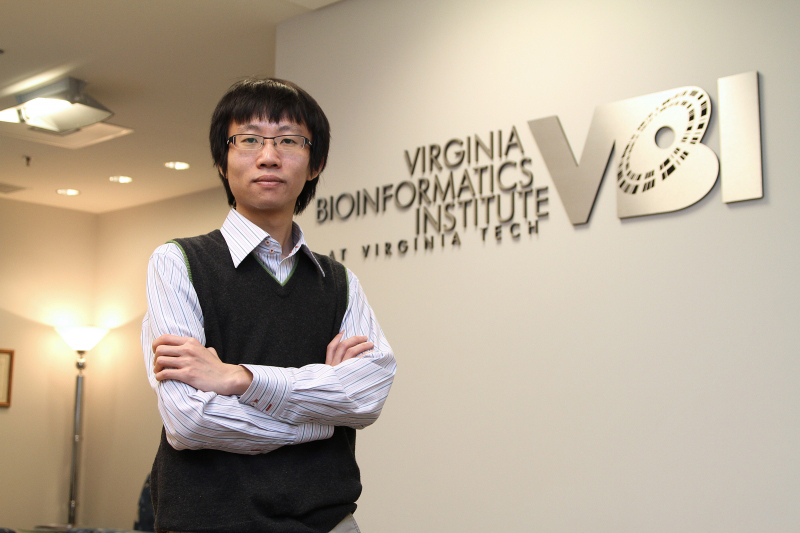Virginia Bioinformatics Institute graduate research assistant named 2010 Outstanding Interdisciplinary Doctoral Student

A graduate research assistant at the Virginia Bioinformatics Institute has been named the 2010 Outstanding Interdisciplinary Doctoral Student by the Virginia Tech Graduate School.
Yizhi (Patrick) Cai, a student in Virginia Tech’s Genetics, Bioinformatics, and Computational Biology Ph.D. program from Quanzhou City, Fujian Province, People’s Republic of China, received the award on March 25, at the 2010 Graduate Awards Banquet, which was held during the university’s Graduate Education Week.
Cai was recognized for his contributions to Virginia Tech and the greater scientific community through his research, teaching, and service.
Cai is a member of Virginia Bioinformatics Institute’s Associate Professor Jean Peccoud’s Synthetic Biology Group, where his work has focused on applying linguistic methods to design synthetic genetic systems. He is developing semantic models to relate DNA sequences to their phenotypic behavior with the goal of helping biologists better leverage the power of gene synthesis and recombinant DNA technologies.
Cai’s work, along with the efforts of other researchers in the Synthetic Biology Group, has contributed to the development of GenoCAD, a software tool that allows the non-specialist to design and validate large-scale genetic systems for use in basic biological research or product development programs. Cai has also contributed to five publications in well-known life science and computational biology journals, serving as lead author on three of the papers, and was one of only three graduate students worldwide invited to attend the 7th Annual National Academies Keck Futures Initiative (NAKFI) conference, which was organized by the National Academy of Sciences, the National Academy of Engineering, and the Institute of Medicine.
"I am truly grateful to Drs. Brett Tyler and David Bevan, and also Ms. Dennie Munson, who serve on the steering committee of the [Genetics, Bioinformatics, and Computational Biology] program,” said Cai. “They, along with my fellow [genetics, bioinformatics, and computational biology] students, have been incredibly supportive and helpful. It truly is the people involved who make it such a wonderful program.”
While research has been the focus of his Ph.D. work, Cai has also volunteered as a teaching assistant in the Virginia Tech College of Engineering’s Department of Computer Science and has been actively involved in the university’s team for iGEM, the international Genetically Engineered Machine competition. In 2007, Cai was named the Asian ambassador for iGEM and received funding from the Massachusetts Institute of Technology (MIT) to promote synthetic biology to undergraduate students in Asia.
Cai is also an active member of the university’s [Genetics, Bioinformatics, and Computational Biology] program, representing the group as a Virginia Tech Graduate Student Assembly delegate and serving as chair for GenBioOrg, an organization established to help provide academic, educational, and social cohesiveness for [genetics, bioinformatics, and computational biology] students and promote the program and field of study to the Virginia Tech community. He completed his undergraduate work at Central South University in China and received his master’s of science degree from the University of Edinburgh.
“By successfully positioning himself at the interface between computer science, biology, and engineering, Patrick has managed to make significant contributions that have been published in high impact journals and presented at international conferences,” said Peccoud. “Despite his young age, he is already attracting and mentoring students in the field. He is an outstanding student who really shines in interdisciplinary research.”
“I commend Patrick for his outstanding work and service to the university,” said Virginia Bioinformatics Institute Executive Director Harold “Skip” Garner. “[The Virginia Bioinformatics Institute] is a staunch supporter of Virginia Tech’s [Genetics, Bioinformatics, and Computational Biology] program, which, like [the institute], embraces the idea that integrating different disciplinary approaches will result in groundbreaking research. Like other [genetics, bioinformatics, and computational biology] students working in our research groups, Patrick has made real contributions to the institute’s success.”




